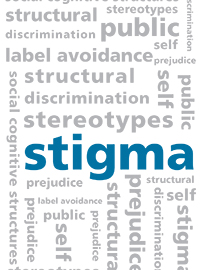Observation
NEW PSPI REPORT: Stigma as a Barrier to Mental Health Care
 Despite the availability of effective evidence-based treatment, about 40% of individuals with serious mental illness do not receive care, and many who begin an intervention fail to complete it. A new report published in Psychological Science in the Public Interest investigates stigma as a significant barrier to care for many individuals with mental illness.
Despite the availability of effective evidence-based treatment, about 40% of individuals with serious mental illness do not receive care, and many who begin an intervention fail to complete it. A new report published in Psychological Science in the Public Interest investigates stigma as a significant barrier to care for many individuals with mental illness.
Although stigma is only one of many factors that may influence care seeking, it has profound effects for those who suffer from mental illness. In the report, Patrick W. Corrigan of the Illinois Institute of Technology and coauthors Benjamin G. Druss of Emory University and Deborah A. Perlick of Mount Sinai Hospital in New York synthesize the available scientific literature, identifying different types of stigma that can prevent individuals from accessing mental health care.
Public stigma emerges when pervasive stereotypes — that people with mental illness are dangerous or unpredictable, for example — lead to prejudice against those who suffer from mental illness. The desire to avoid public stigma causes individuals to drop out of treatment or avoid it entirely. Public stigma may also influence those closest to individuals with mental illness, including friends, family, and care providers.
Corrigan and colleagues note that stigma becomes structural when it pervades societal institutions and systems. The facts that mental health care is not covered by insurance to the same extent as other medical care and that mental health research is not funded at the same levels as medical research, are two clear indications that mental-illness stigma continues to exist at the structural level.
In the face of these realities, the report identifies approaches to addressing stigma that can help increase care seeking among those with mental illness. These approaches operate at various levels, from promoting personal stories of recovery and enhancing support systems to instituting public policy solutions that enhance systems of care.
“This issue of Psychological Science in the Public Interest makes a strong start in consolidating and disseminating what we now know — that public policy, the law, and media remain our greatest resources to stimulate change and spur action,” former US First Lady Rosalynn Carter, Rebecca Palpant Shimkets, and Thomas H. Bornemann of the Carter Center Mental Health Program write in a commentary that accompanies the report. “We also need to build bridges to other fields that connect to mental health, such as public health, primary care, and education.”
The report, “The Impact of Mental Illness Stigma on Seeking and Participating in Mental Health Care,” and the accompanying commentary are available online for free to the public at
www.psychologicalscience.org/r/stigma.





Comments
In creating programs and a platform to help people deal with their mental health, I faced the challenges of the stigma when I used the term “mental health”. When I said “mental health” people would always jump to illness, therapy or they would snicker and say something like “I’m not crazy yet, but a few more months in this job and I will be…” It was extremely difficult to promote our programs because no one would admit that they needed them…or people just didn’t think they needed them. So I started using the term psychological health and fitness and started relating psychological health and fitness to their life condition and experiences. This has made a huge difference in the way people perceive the health of their mind and has made them more receptive to getting started on a psychological fitness program. Of course, these psychological fitness programs are preventive in nature and do not replace therapy or other forms of intervention, but they do establish a “normalcy” of having psychological fitness as part of their overall healthcare and quality of life. I believe that once we have psychological health as part of mainstream health and wellness regimes, the stigma will gradually disappear. Think about it this way: When people go to the gym, they do not fear that others think they are sick. In fact, people that go to the gym are admired by others…because they are taking care of themselves. The same could be said for psychological fitness.
APS regularly opens certain online articles for discussion on our website. Effective February 2021, you must be a logged-in APS member to post comments. By posting a comment, you agree to our Community Guidelines and the display of your profile information, including your name and affiliation. Any opinions, findings, conclusions, or recommendations present in article comments are those of the writers and do not necessarily reflect the views of APS or the article’s author. For more information, please see our Community Guidelines.
Please login with your APS account to comment.